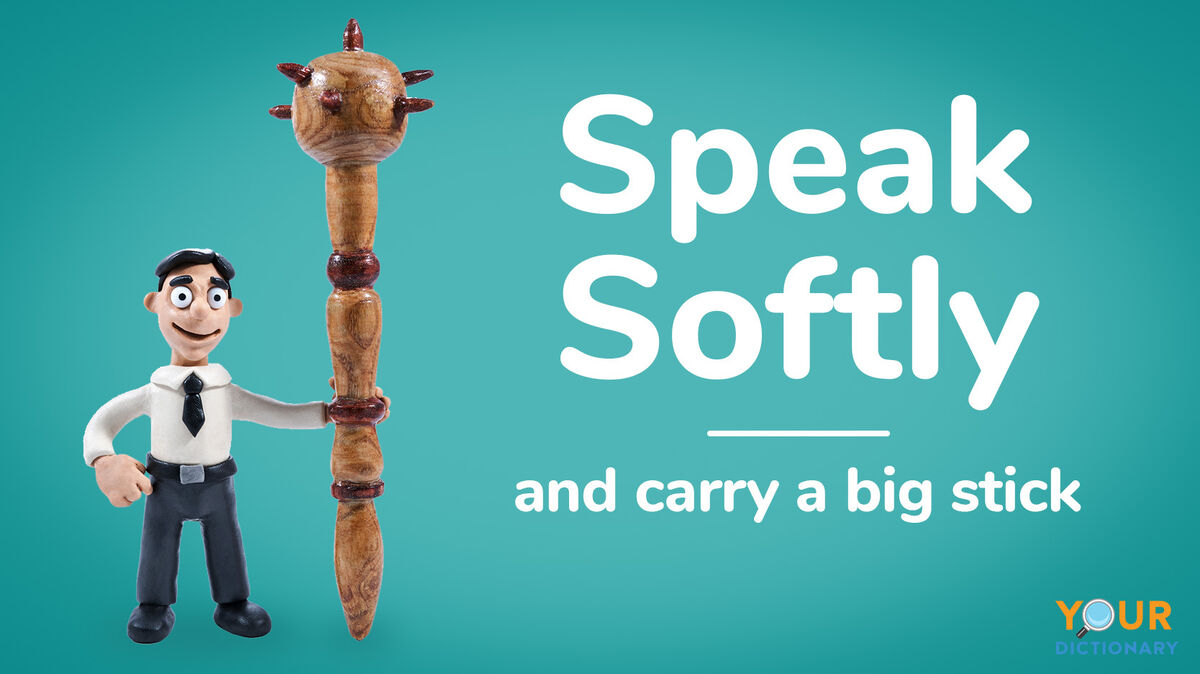
You've probably heard the phrase "speak softly and carry a big stick" before, but do you know what it really means? The wording might conjure the image of someone whispering while wielding a large piece of wood, but that's not the story of what this saying really means.
Origin of Speak Softly and Carry a Big Stick
The phrase "speak softly and carry a big stick" became a common expression after U.S. President Theodore Roosevelt first publicly used it in a 1901 speech. There was a bit more to the full statement Roosevelt used in his speech. The complete wording is:
"Speak softly and carry a big stick — you will go far."
The full phrase indicates that success is likely to result when you take a nicer approach even when everyone involved knows that you have a more forceful option at your disposal.
At the time he first used the phrase publicly, Roosevelt referred to it as a West African proverb. However, researchers have not been able to prove that this phrase originated in West Africa or that it had been used anywhere else before President Roosevelt's speech. It is possible, even likely, that the phrase originated with President Roosevelt.
Big Stick Diplomacy
Roosevelt did not intend for the phrase "speak softly and carry a big stick" to be taken literally. Instead, this phrase was intended to be a figurative description of his approach to diplomacy and foreign policy. This approach came to be known as big stick diplomacy, a defining characteristic of Roosevelt's residency. The idea is that diplomacy backed up by power and a willingness to use it will lead to success.
- speak softly - Engage in sincere negotiation with the goal being to reach a military agreement.
- big stick - If negotiation doesn't work, other forceful measures will be used (military force, economic power).
Roosevelt advocated for first seeking a diplomatic solution (by figuratively speaking softly) to foreign affairs matters. However, he also wanted those who entered into peaceful talks or negotiations with representatives of the U.S. government to be well aware of the power of the country's military force and/or economic power (both examples of proverbial big sticks) and its leaders' willingness to use them to advance the country's interests.
Examples of Roosevelt's Big Stick Diplomacy
During Roosevelt's presidency, his foreign policy actions often reflected the big stick approach to diplomacy.
- When Britain and Germany implemented a 1902 blockade of Venezuela, Roosevelt spoke out against their actions and called for the blockade to end. Simultaneously, he built up the U.S. naval presence nearby, making it apparent that his soft words were backed up by a big stick.
- The Colombian and French companies overseeing the construction of the Panama Canal engaged in price gouging. Diplomacy didn't solve the problem, so the U.S. government actively encouraged and helped fund a revolution that led to Panama breaking free from Colombia to become an independent republic in 1903. In this case, money was the big stick.
- In order to make the world aware of one of America's big sticks, in 1907 Roosevelt sent the country's updated armada of warships, known as the Great White Fleet on an excursion around the world. This tour was touted as a training exercise, so its official purpose was peaceful. However, the big stick nature of the voyage was quite clear.
Big stick diplomacy may have started with Roosevelt, who is the only person to serve three terms as a U.S. president, but it remains in use as a diplomatic strategy today.
Everyday Examples of Speak Softly and Carry a Big Stick
Even if you have no interest in political diplomacy or foreign relations, you have probably experienced the speak softly and carry a big stick approach in your life. Any time someone seeks to get something done by asking nicely rather than using a more forceful approach, that person is adhering to the philosophy of speaking softly and carrying a big stick.
- When your parents ask you nicely to clean your room rather than informing you that you won't be leaving the house or using your computer or cell phone until it's done, but you know what the consequence of failing to do so would be.
- When a teacher asks a student if they would like to resubmit an assignment, and the student knows that the teacher will call their parents if the student doesn't agree to do so.
- When a sibling knows that you did something wrong and keeps asking you for favors, which you do because you believe that they'll otherwise tell your parents what you did wrong.
- When a manager asks an employee if he or she is willing to work overtime rather than telling the employee that he or she is required to work overtime, but the employee knows the manager can make it a requirement.
- When a client asks a service provider to match a competitor's pricing, and the service provider knows the client will take their business elsewhere if the request is not met.
Getting the Message Across
When you have the power to make something happen by force but choose to take a kinder, gentler approach before resorting to that, you are speaking softly while carrying a big stick. If you enjoyed learning the meaning behind this proverb, explore some other common expressions and what they mean.